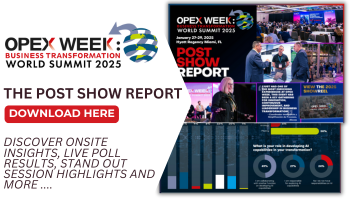Make people front and center of change management
People and their skills, knowledge and experience are the main drivers of business value
Add bookmark
Can you remember the last time you had a life-changing process? Me neither! When we talk about all the big events that happen in our lives, you won’t ever hear anyone say “that was an amazing process.” No-one ever attended a wedding and said: “What a process that was!”
People experience events, including changes in the workplace. Managing change well and delivering the maximum value possible from the change requires people to be front and center. However, too often we prioritize process over people. It can be focusing on the investment case numbers and failing to communicate a compelling case for change or establishing a heavyweight governance process to assure delivery but forgetting to engage and support team members during delivery. It can also involve chasing benefits but failing to build capability and confidence in the teams that will deliver the benefits along with leaders being consumed by activities rather than behaviors.
Delivering change well demands good processes and good experiences. They are not mutually exclusive – you need both.
Don't miss any news, updates or insider tips from PEX Network by getting them delivered to your inbox. Sign up to our newsletter and join our community of experts.
Why do digital transformations fail?
You may have heard of the stat that 70 percent of digital transformation projects fall short of their goals. McKinsey also reports that only 16 percent of employees believe their company’s digital reforms improve productivity and are sustainable over the long-term. So why does this happen?
We think these stats reflect many well-intentioned efforts to optimize processes, rather than people, when trying to deliver change. There are a number of reasons for this:
- Lack of understanding of how to deliver change well. Frameworks, tools and techniques only work when combined with capability, experience and preparedness.
- It is easier to focus on outputs – good performance and pace of delivery – than on the people and partnerships required to deliver those outputs.
- There is often a reluctance within executive teams to talk about how to bring people on a change journey. This is leadership EQ, when many leaders feel much happier using their IQ.
- Leaders often layer processes onto change projects without recognizing there’s a ‘messy middle’ involving their people that demands more than process control.
There’s strong evidence to support the argument for people-centred change management:
- Organizations that increased their employee net promoter score (eNPS) during large-scale transformations generated total shareholder returns and EBIT margins twice that of peers (Bain & Company).
- Change accelerators see 264 percent more revenue growth compared to companies with below-average change effectiveness (WTW).
- Almost all (93 percent) of organizations that report excellent change management effectiveness meet or exceed their objectives (Prosci, Inc).
There’s a clear imperative to get better at delivering change; indeed, Gartner reported in 2022 that the average employee will experience 10 enterprise changes during their career.
The importance of adopt and adapt
When we talk to leaders about change, we stress the importance of the activities required to adopt and adapt. Many leaders will say their businesses are good at adoption, but without sufficient investment of time and money, new solutions and processes can quickly become localized and sub-optimal.
Good adoption demands:
- The development and consistent use of standards.
- Retiring old legacy ways of working.
- Real world application and rapid implementation of changes.
- A center of excellence to guide, nudge, support and challenge.
However, adoption needs to be coupled with adaptation to be truly impactful. The IDC Worldwide Transformation Spending Guide estimates that global spending on digital transformation will hit US $3.4 trillion in 2026, but how much of that is spent adapting the environment, structures, roles, capabilities, ways of working and behaviors? People and their skills, knowledge and experience are the main drivers of value in businesses.
Adaptation, then, goes beyond implementation of a new solution. It is about supporting people to understand and wholly engage with the new ambition for the business, and all of the structural, digital, behavioral and operational implications that will entail. It is about minimizing uncertainty to enable team members to engage positively with change and continue to deliver their day job.
Leaders also need support to communicate and consult well, establish good governance mechanisms, create productive environments and develop the executive team to set a confidence-inspiring tone for the next phase of the business.
The message here is that you can design and build the best solution ever but if you don’t support people to adopt and adapt then you will never realize its true potential. The good news is that, if you learn to do this well, then you will reduce uncertainty, drive value and have the makings of a truly agile organization.
The 26th Annual OPEX Week: Business Transformation World Summit | post show report

Over 550 transformation leaders from 200 companies across 17 countries gathered to share innovations and stories at OPEX Week 2025. The three unforgettable days sparked groundbreaking ideas and invaluable connections. Don't worry—we've got you covered with a full recap of the 2025 OPEX Week. Download the post-show report here.
To view this content, please fill out the form to register and become a member.
Or, if you're already a member, sign in below to view.
Please note: That all fields marked with an asterisk (*) are required.
























